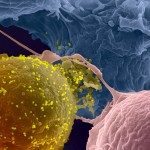Link to Pubmed [PMID] – 27601221
EMBO Rep. 2016 Sep;
The interferon-induced transmembrane (IFITM) proteins protect host cells from diverse virus infections. IFITM proteins also incorporate into HIV-1 virions and inhibit virus fusion and cell-to-cell spread, with IFITM3 showing the greatest potency. Here, we report that amino-terminal mutants of IFITM3 preventing ubiquitination and endocytosis are more abundantly incorporated into virions and exhibit enhanced inhibition of HIV-1 fusion. An analysis of primate genomes revealed that IFITM3 is the most ancient antiviral family member of the IFITM locus and has undergone a repeated duplication in independent host lineages. Some IFITM3 genes in nonhuman primates, including those that arose following gene duplication, carry amino-terminal mutations that modify protein localization and function. This suggests that “runaway” IFITM3 variants could be selected for altered antiviral activity. Furthermore, we show that adaptations in IFITM3 result in a trade-off in antiviral specificity, as variants exhibiting enhanced activity against HIV-1 poorly restrict influenza A virus. Overall, we provide the first experimental evidence that diversification of IFITM3 genes may boost the antiviral coverage of host cells and provide selective functional advantages.

